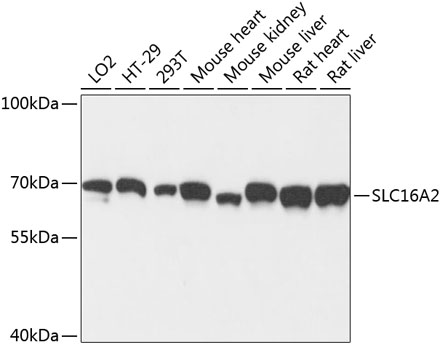Signal Transduction Antibodies 2
Anti-SLC16A2 Antibody (CAB3636)
- SKU:
- CAB3636
- Product Type:
- Antibody
- Reactivity:
- Human
- Reactivity:
- Mouse
- Reactivity:
- Rat
- Host Species:
- Rabbit
- Isotype:
- IgG
- Research Area:
- Signal Transduction
Description
| Antibody Name: | Anti-SLC16A2 Antibody |
| Antibody SKU: | CAB3636 |
| Antibody Size: | 20uL, 50uL, 100uL |
| Application: | WB |
| Reactivity: | Human, Mouse, Rat |
| Host Species: | Rabbit |
| Immunogen: | Recombinant fusion protein containing a sequence corresponding to amino acids 1-100 of human SLC16A2 (NP_006508.2). |
| Application: | WB |
| Recommended Dilution: | WB 1:500 - 1:2000 |
| Reactivity: | Human, Mouse, Rat |
| Positive Samples: | LO2, HT-29, 293T, Mouse heart, Mouse kidney, Mouse liver, Rat heart, Rat liver |
| Immunogen: | Recombinant fusion protein containing a sequence corresponding to amino acids 1-100 of human SLC16A2 (NP_006508.2). |
| Purification Method: | Affinity purification |
| Storage Buffer: | Store at -20'C. Avoid freeze / thaw cycles. Buffer: PBS with 0.02% sodium azide, 50% glycerol, pH7.3. |
| Isotype: | IgG |
| Sequence: | MALQ SQAS EEAK GPWQ EADQ EQQE PVGS PEPE SEPE PEPE PEPV PVPP PEPQ PEPQ PLPD PAPL PELE FESE RVHE PEPT PTVE TRGT ARGF QPPE GGFG |
| Gene ID: | 6567 |
| Uniprot: | P36021 |
| Cellular Location: | Cell membrane, Multi-pass membrane protein |
| Calculated MW: | 59kDa |
| Observed MW: | 70kDa |
| Synonyms: | SLC16A2, AHDS, DXS128, DXS128E, MCT 7, MCT 8, MCT7, MCT8, MRX22, XPCT |
| Background: | This gene encodes an integral membrane protein that functions as a transporter of thyroid hormone. The encoded protein facilitates the cellular importation of thyroxine (T4), triiodothyronine (T3), reverse triiodothyronine (rT3) and diidothyronine (T2). This gene is expressed in many tissues and likely plays an important role in the development of the central nervous system. Loss of function mutations in this gene are associated with psychomotor retardation in males while females exhibit no neurological defects and more moderate thyroid-deficient phenotypes. This gene is subject to X-chromosome inactivation. Mutations in this gene are the cause of Allan-Herndon-Dudley syndrome. |
| UniProt Protein Function: | SLC16A2: Very active and specific thyroid hormone transporter. Stimulates cellular uptake of thyroxine (T4), triiodothyronine (T3), reverse triiodothyronine (rT3) and diidothyronine. Does not transport Leu, Phe, Trp or Tyr. Defects in SLC16A2 are the cause of monocarboxylate transporter 8 deficiency (MCT8 deficiency); also known as Allan-Herndon-Dudley syndrome (AHDS). MCT8 deficiency consists of a severe form of X-linked psychomotor retardation combined with abnormal thyroid hormone (TH) levels. Thyroid hormone deficiency can be caused by defects of hormone synthesis and action, but it has also been linked to a defect in cellular hormone transport. Affected patients are males with abnormal relative concentrations of three circulating iodothyronines, as well as severe neurological abnormalities, including global developmental delay, central hypotonia, spastic quadriplegia, dystonic movements, rotary nystagmus, and impaired gaze and hearing. Heterozygous females had a milder thyroid phenotype and no neurological defects. Belongs to the major facilitator superfamily. Monocarboxylate porter (TC 2.A.1.13) family. |
| UniProt Protein Details: | Protein type:Membrane protein, multi-pass; Transporter; Membrane protein, integral; Transporter, SLC family Chromosomal Location of Human Ortholog: Xq13.2 Cellular Component: membrane; integral to plasma membrane; integral to membrane Molecular Function:thyroid hormone transmembrane transporter activity; monocarboxylic acid transmembrane transporter activity; transporter activity; symporter activity Biological Process: monocarboxylic acid transport; transport Disease: Allan-herndon-dudley Syndrome |
| NCBI Summary: | This gene encodes an integral membrane protein that functions as a transporter of thyroid hormone. The encoded protein facilitates the cellular importation of thyroxine (T4), triiodothyronine (T3), reverse triiodothyronine (rT3) and diidothyronine (T2). This gene is expressed in many tissues and likely plays an important role in the development of the central nervous system. Loss of function mutations in this gene are associated with psychomotor retardation in males while females exhibit no neurological defects and more moderate thyroid-deficient phenotypes. This gene is subject to X-chromosome inactivation. Mutations in this gene are the cause of Allan-Herndon-Dudley syndrome. [provided by RefSeq, Mar 2012] |
| UniProt Code: | P36021 |
| NCBI GenInfo Identifier: | 114152841 |
| NCBI Gene ID: | 6567 |
| NCBI Accession: | P36021.2 |
| UniProt Secondary Accession: | P36021,Q7Z797, |
| UniProt Related Accession: | P36021 |
| Molecular Weight: | 539 |
| NCBI Full Name: | Monocarboxylate transporter 8 |
| NCBI Synonym Full Names: | solute carrier family 16, member 2 (thyroid hormone transporter) |
| NCBI Official Symbol: | SLC16A2 |
| NCBI Official Synonym Symbols: | AHDS; MCT7; MCT8; XPCT; MCT 7; MCT 8; MRX22; DXS128; DXS128E |
| NCBI Protein Information: | monocarboxylate transporter 8; monocarboxylate transporter 7; X-linked PEST-containing transporter |
| UniProt Protein Name: | Monocarboxylate transporter 8 |
| UniProt Synonym Protein Names: | Monocarboxylate transporter 7; MCT 7; Solute carrier family 16 member 2; X-linked PEST-containing transporter |
| Protein Family: | Monocarboxylate transporter |
| UniProt Gene Name: | SLC16A2 |
| UniProt Entry Name: | MOT8_HUMAN |
View AllClose







